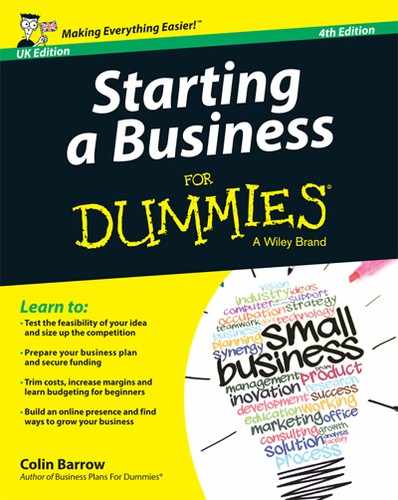Book Description
Starting your own business is an exciting - and challenging - time.
This updated edition of the startup classic shows you how to build a business agile enough to take advantage of emerging trends and opportunities, and sturdy enough to weather any storm. Packed with real-life examples and links to hundreds of valuable resources, Starting a Business For Dummies, 4th Edition gives you what you need to make the leap from employee to successful entrepreneur with confidence.
All your favourite, trusted content has been updated including:
Laying the groundwork and testing the feasibility of your business idea
Writing a winning business plan and finding funding
How to operate effectively, including managing your finances and employing people
Growing your business and improving performance
New content includes:
The latest funding schemes, including government funding and crowdfunding
Tendering for public sector work
Avoiding business cyber-crime
Franchising and pop ups
Exporting (the government has set a target of doubling the number of exporting companies by 2020)
Environmental impact (a recent survey found 77% of SMEs wanted to know how to measure and improve their environmental impact)
Table of Contents
- Introduction
- Introduction
- Part I: Getting Started with Your New Business
- Chapter 1: Preparing for Business
- Chapter 2: Doing the Groundwork
- Chapter 3: Can You Do the Business?
- Chapter 4: Testing Feasibility
- Part II: Making and Funding Your Plan
- Chapter 5: Structuring Your Business
- Chapter 6: Preparing the Business Plan
- Chapter 7: Getting Help
- Chapter 8: Finding the Money
- Chapter 9: Considering Your Mission
- Chapter 10: Marketing and Selling Your Wares
- Making Up the Marketing Mix
- Defining Your Product or Service Parameters
- Using Advertising to Tell Your Story
- Considering the customer’s point of view
- Making an exhibition of yourself
- Setting advertising objectives
- Deciding the budget
- Defining the message
- Choosing the media
- Choosing the frequency
- Writing a leaflet
- Using the Internet for viral marketing
- Providing opportunities to see
- Figuring your bang-for-the-buck ratio
- Getting into the News
- Using Blogs and Social Networks
- Selling and Salesmanship
- Settling On a Price
- Pondering Place and Distribution
- Part III: Staying in Business
- Chapter 11: Employing People
- Chapter 12: Operating Effectively
- Chapter 13: Keeping Track of Finances
- Chapter 14: Managing Your Tax Position
- Part IV: Making the Business Grow
- Chapter 15: Doing Business Online
- Chapter 16: Improving Performance
- Chapter 17: Exploring Strategies for Growth
- Chapter 18: Becoming a Great Manager
- Part V: The Part of Tens
- Chapter 19: Ten Pitfalls to Avoid
- Chapter 20: Ten People to Talk to Before You Start
- Speaking with Your Spouse
- Making Use of Your Professional Network
- Benefiting from Entrepreneurs Who Started a Similar Business
- Spending Time with a Friendly Banker
- Reaching Out to Customers
- Communicating with Your Current Boss
- Calling Your Colleagues
- Bringing in Your Best Friend
- Reporting to an Accountant
- Plugging into a Business Angel Network
- Chapter 21: Ten Reasons for Using Social Media
- About the Author
- Cheat Sheet
- More Dummies Products
